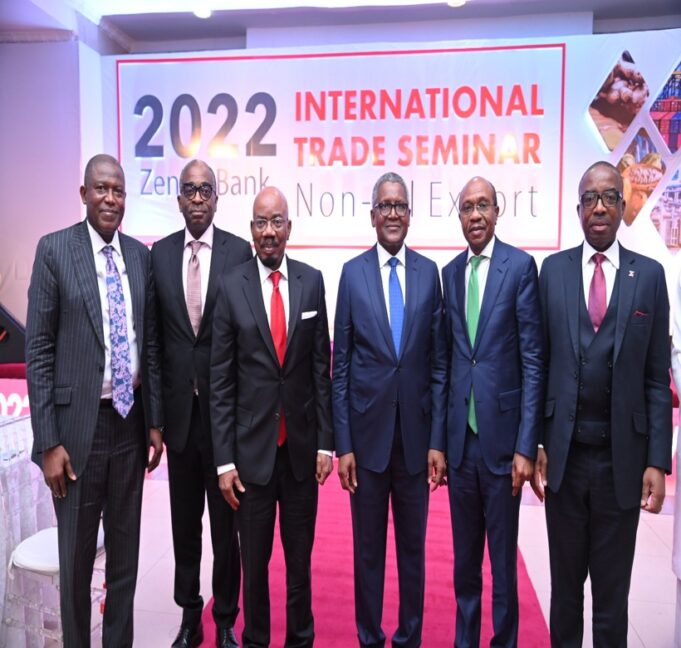Stakeholders have called for support of Nigeria’s non-oil export sector for economic rejuvenation.
They made the call at the 7th annual edition of the Zenith Bank International Trade Seminar held at the Civic Centre, Victoria Island in Lagos State on Wednesday.
The event was held with the theme, ‘Unlocking Opportunities in Nigeria’s Non-Oil Export Business’.
Speaking at the event, the Founder and Chairman of Zenith Bank Plc, Mr. Jim Ovia, called for a concerted effort toward diversifying Nigeria’s export base through the promotion of non-oil exports.
Highlighting the importance of non-oil export to the nation’s economy, Ovia said Nigeria exported cocoa and several other non-oil products for years before oil was discovered.
The Zenith Bank Chairman cited the example of the 25-storey Cocoa House in Ibadan, which was built with proceeds from cocoa exports.
He added that many countries in the world, such as Japan and China were successful because they “are doing a great deal of innovation, production and manufacturing of goods and services”.
“We should also look at promoting the nation’s non-oil export sector through technology to create technological giants like Apple, Tesla, and Google. And we already have technology companies in this mould in Nigeria, such as Flutterwave, which has a valuation of $3 billion, making it more valuable than some banks in Nigeria,” Ovia added.
Speaking on the enormous potential in Nigeria’s non-oil sector, Ovia said the phenomenal growth of the country’s emerged from financial technology (Fintech) companies such as Flutherwave, OPay, Interswitch, Kuda and Paystack, with market valuations of $3 billion, $2 billion, $1 billion, $500 million, $200 million, respectively.
He added that the development underscores the enormous opportunity in the Fintech space, noting that the most capitalised companies in the world, such as Apple, Microsoft, Alphabet (Google), Amazon, Tesla, Visa, etc., are not oil companies but are in the technological innovation space.
In his address, the Group Managing Director/CEO of Zenith Bank, Mr Ebenezer Onyeagwu, said the annual Zenith Bank Trade Seminar has served as a veritable platform to deepen the conversation on promoting non-oil export in Nigeria, bringing together non-oil export practitioners and relevant government agencies to interact and explore the opportunities, and proffer solutions to the challenges of non-oil export in the country.
Speaking on the origin of the Zenith Bank Annual International Trade Seminar, Onyeagwu said the commodity price slump of 2014-2016 was a watershed moment.
He said: “When crude oil prices plummeted from $114.55 per barrel in June 2014 to $28.76 in January 2016, with an attendant effect on the availability of foreign exchange, it was time to look towards the non-oil export sector for a more sustainable source of foreign exchange that is not susceptible to external shocks and price volatility.”
While highlighting some of the salient outcomes of the past six Zenith Bank Annual International Trade Seminar editions, Onyeagwu noted that previous editions’ outcomes have found expression and influenced policy initiatives.
“For instance, the extension of the period of repatriation of Non-Oil Export proceeds from 90 days to 180 days and the policy mandating shippers not to carry export without a Nigeria Export Proceeds (NXP) Form Number were recommendations from previous seminars.
“Also, the need to incentivise exporters to repatriate their export proceeds through the official channels and the recommendation to create export terminals across various export hubs in the country were also from past seminars.
“Also, previous editions recommended having Export Desks in commercial banks, which has now been instituted,” he said.
Onyeagwu added that Zenith Bank has trained over 100 exporters through its Zero to Hero programmes which provide a platform for grooming and exposing beginners to become strong exporters by providing training on documentation, product sourcing, and access to market and financing.
He noted that the bank would continue the advocacy of promoting non-oil export.
On his part, the Governor of the Central Bank of Nigeria (CBN), Godwin Emefiele, commended Zenith Bank and its leadership led by the Founder and Chairman of the Board, Jim Ovia, for its laudable initiative in organising an annual export seminar to explore opportunities in Nigeria’s non-oil export
Emefiele said: “This is why the theme of this year’s seminar ‘Unlocking Opportunities in Nigeria’s Non-Oil Export Business’ is timely and appropriate. This is because the global economy and structure are changing rapidly before our eyes.
“The previous world economic order underpinned by globalization and seamless trade possibilities seems to be suffering major disruptions lately. We believe Nigeria has a lot of potential, and we can harness this for the good of our people and country.”
The CBN Governor added that the apex banks has undertaken several initiatives to promote the non-oil export sector because of its firm belief that the non-oil export sector holds enormous potential to contribute to employment generation, wealth creation and economic growth of the country.
Also speaking at the event, the President and Chief Executive of Dangote Group, Alhaji Aliko Dangote, said: “Nigeria’s non-oil export is quite low compared to other African top oil producers. This exposes the economy to oil price/production risks. There is much room for growth, and the CBN is helping drive this through the RT200 programme.”
According to Dangote, the CBN RT200 FX programme, which aims to achieve $200 billion in foreign exchange earnings from non-oil proceeds over the next 3-5 years, has very laudable objectives, including enhancing foreign exchange inflow, diversifying the source of FX inflow, increasing the level of contribution from non-oil export, and ensuring stability and sustainability of FX flows.
Others, who spoke at the event, were the Secretary General of the African Continental Free Trade Area (AfCFTA), Wamkele Mene, and the President of African Export-Import Bank (Afreximbank), Prof. Benedict Oramah.
- UBA unveils upgraded PoS terminal, revamped MONI app to boost digital payments - April 13, 2025
- Presidency: What Tinubu discussed with Trump’s aide in Paris - April 13, 2025
- NDLEA nabs Malaysian returnee with drugs hidden in music speakers - April 13, 2025








